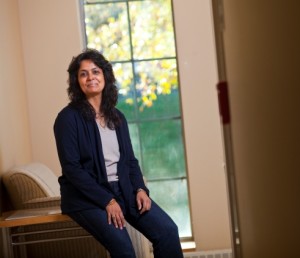
Jamila Bookwala
Jamila Bookwala couldn’t wait to turn 40. That’s because the associate professor of psychology, now 46, has done enough research in the field of aging to know that life can get sweeter with time.
Her experience confirmed what years of her research into the psychology of aging had revealed – that middle and old age is not something to dread but a pathway to new joys. “There are gains and losses as we get older, as at every life stage,” she says. “What we may lose in physical abilities in late life, we gain in social relationships and wisdom. Our emotional well-being can be just as high later in life.”
That’s easy to understand when you’re of a certain vintage, but getting a 20-year-old to appreciate the value of being older is often a challenge. In Bookwala’s Adult Development and Aging course, students are required to chronicle early memories, accomplishments, reflections, and hopes of someone they know who is 50 or older. They then compare the life story of the person they interviewed – often a grandparent or relative – with normative findings discussed in class regarding older adults.
Students describe the assignment as “deeply meaningful,” Bookwala says, and often gain a new appreciation for the life of their interviewees.
“It’s a way to make aging personal,” says Bookwala. “For 20-year-olds, aging is remote. The richness of experience that comes with age may be lost on them.”
Bookwala, who grew up and attended school in India, first came to the U.S. in 1986. She received a doctoral degree in psychology at the University of Pittsburgh and a master’s degree in psychology from the City University of New York. She got interested in gerontology after helping one of her professors conduct research on the stresses associated with caring for an ill spouse. Her research today focuses on the health effects of late life stress (including caregiving), the role of marital status and marital quality in health outcomes as we age, and gender-related issues in adult well-being.
Her interest in marital research using middle-aged and older adults developed while at Lafayette. “Traditionally, marital research focused on newlyweds,” she says. “There was little on marital relationships in later life.”
Successful aging and interpersonal relationships continue to be the focus of Bookwala’s research and in 2009 she made international headlines for a study on the psychological health of unmarried adults over the age of 40. Her study found that if they’re self-sufficient and feel a sense of mastery over their lives, they can have as good or better emotional well-being compared to their married counterparts.
Since she joined Lafayette, several students have collaborated with Bookwala on her research, most recently psychology major Brendan Lawson ’11 (Bernardsville, N.J.) who has worked with Bookwala on studying the impact of poor vision on mental health. Much of what she studies informs her classes, providing her students with a richer, more relevant teaching and learning experience.
“I love doing research as much as I love teaching,” she says. “Being at Lafayette allows me to do both – to be a dedicated teacher and a committed scholar. They go hand in hand for me.”
